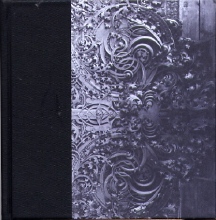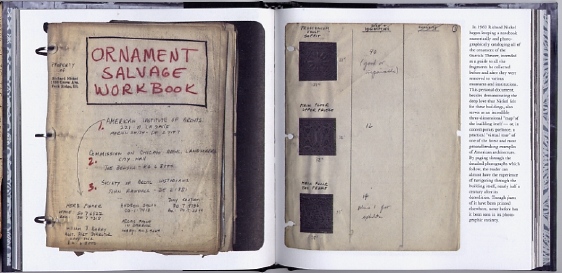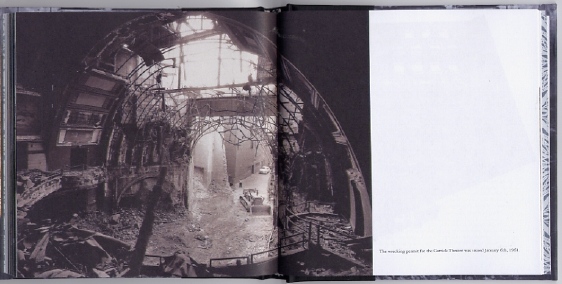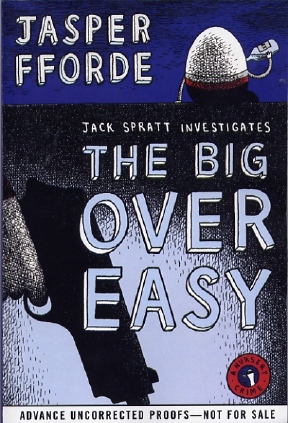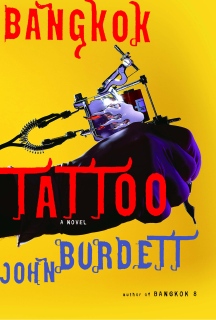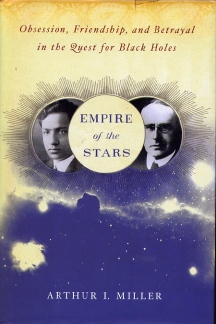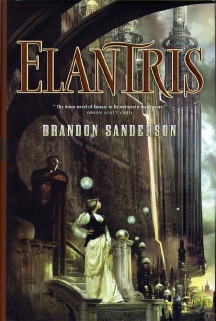|
|
|
This Just In...News from the Agony Column
|
05-20-05: Lost Buildings by Ira Glass and Chris Ware |
|||||||||
Lights,
Camera, Embarrassment
Today we're straining at the leash looking at a book my wife bought me a while back that just came in the mail -- 'Lost Buildings' by Ira Glass and Chris Ware (WBEZ Chicago / PRI ; 2004 ; $120.00). Yes, that Ira Glass. Yes, that $120.00. It includes a DVD, and a book about the size of your wallet. If your wallet is as anemic as mine, that is. Now, every book has a story. So, here's the story of this book. About what, a month -- maybe a month and a half ago? -- it was pledge break time at our local NPR station, KUSP, where I am all-too-often (for some people's tastes) allowed to produce interviews. You hear the unexpurgated versions on my site, if you care to. So, during the broadcast of one of my colleague's interviews -- damn, I can't remember who it was he was interviewing, and it was good -- the book group got together and did their pledge break shtick. They provided the literary voices and held down the huckster role. So what? We are actually trying to get money out of the audience. Anyway. While the interview is playing and the phones are emitting a din-like silence, I'm slipping out of the room and phoning the wife at work and requesting that she call in and make a pledge. When the time comes for us to talk they handle the smooth "We're bringing you the best in..." etc and I handle the "Thanks go out to!" in my best Ronco-finger slicer voice. And of course, it soon becomes obvious that I'm thanking my wife.
Now, to my mind,
the point being to bring in the money and help juice the wheels, well,
calling the wife to make a pledge is a good thing. But the
vibe I got was more along the line of what one might expect were one
to pick up salad with your fingers in a fancy restaurant. Sure, I could
do
that, but -- really! Really. I did it. I'd do it again.
Well, that tempest
blows right out of the teapot, and you can tell I'm over it. Right!
Well, what the hell, because the end result is that I now
have this 'Lost Buildings' booklet and DVD and it's a gorgeous, beautiful,
book that I utterly love. (I admit, I saw a sample back then, but
my wife made the choice entirely on her own.)
Most of these buildings
have been destroyed. 'Lost Buildings' contains photos and diagrams
of Sullivan's attempt to preserve even parts
of the buildings. It contains a DVD of the slide show -- a sort
of visual version
of TAL that you can watch to counteract the hyperkinetic crap that
comes through your TV. Watch the DVD first, then read the little
booklet. |
|
05-19-05: Jasper Fforde Serves Up 'The Big Over Easy' |
|||
A
Hardboiled Nursery Crime
I must admit, I've wondered and worried when he would take a break from Thursday Next. The books have been getting stronger and stronger, so I've been happy with each new release. The problem is that you want Fforde to bow out at the top of his game, but then again, you dont want him to bow out if he's still at the top of his game. And how does he follow up such a unique series? Maybe he shouldn't. But he must! These are contradictory, paradoxical feelings that reflect how much we respect this remarkable author. With the release of 'The Big Over Easy' (Viking / Penguin Putnam ; July 25, 2005 ; $24.95) those feelings are quite neatly resolved into one brand-new, different, but still similar novel. Calling itself "A Nursery Crime", 'The Big Over Easy' offers readers another perspective on Fforde's "Fictionverse". Moving the action from Swindon and its environs to Reading, Fforde picks himself a new literary investigator, Detective Inspector Jack Spratt with a new milieu, the mean streets of Reading [ 1 ]. With a new, male lead character, I believe that we're likely to get a novel with a rather different tone than Fforde's Thursday Next series. I've already made the obvious joke in my headline, so let me begin the process of beating it to death here; I dare say that Fforde is likely to take a more hard-boiled tone here. But while I do believe that while he'll likely shave off a thin layer of sweetness -- never overbearing mind you -- that characterized the Thursday next novels, I think we're in for a rather similar self-referential ride here. But even though we've obviously moved from the adult section of the library to the children's room, this is clearly not a children's book; at least no more than the Thursday next novels. 'The Big Over Easy' obviously offers all the complexity that made Fforde's other work so enjoyable. 'The Big Over Easy' finds DI Jack Spratt and his assistant, Mary Mary, investigating the death of "Ovoid D-class nursery celebrity Humpty Stuyvesant van Dumpty, minor baronet, ex-convict and former millionaire philanthropist", when he dies, well -- you can well imagine how he dies. But the who, where and why are what Jack's after. And that along with the world are what Fforde's after. He's shown himself to be fully capable of taking absurd characters and situations and treating them with enough respect and seriousness to ensure his novels have a heart as well as a brain. But damn, that brain! Fforde seems to sprout ideas like nobody's business. Here he continues his literary explorations but takes them to whole new levels, both highs and lows. Beanstalks sprout Greek myths. Chapters sprout the kind of silly, foreshadowing headers that made the Thursday Next books so enjoyable. As for the book itself, it looks as if we wont have the pleasure of the illustrations as did the Thursday Next novels, but what I have is merely an advance uncorrected proof. In the last couple of Thursday Next novels, Fforde and his publishers have been choreographing their simultaneous releases well, so that readers on either side of the Atlantic were able to buy domestic copies of the books that were pretty much identical. All of this will not stop compulsive sorts such as myself from buying a couple of copies of every version they make, but that's why I'm sitting writing this for you instead of doing something profitable. I'm hoping to get an advance glance at the UK editions in the fullness of time; when I get them, you'll see them soon afterwards, first on the Rolling Shelves, then in the News. I know that readers are waiting with bated breath. And who knows, for all my prediction of convergence between the publishing companies, Fforde is likely to surprise us. No, make that certain to surprise us. |
|
05-18-05: A Conversation With John Burdett |
|||||||
"...the
culture of guilt versus the culture of shame..."
My guess is that most readers who have not already read his books will respond to this interview the same way I did to the one I heard -- that is, to go out and buy his books. He's a fascinating and very funny guy. We talked a bit about his novel 'The Last Six Million Seconds', set in Hong Kong just before the switchover to China. He tells a fascinating story of being in Hong Kong and under dual rule. We also spoke about Buddhism as a humorous religion, 'Bangkok 8', 'Bangkok Tattoo', and the relationship between prostitution and farm subsidies. It's a perfect interview for neophyte readers, since he gets a bit into the background of the books without referring many specifics or spoilers. Burdett and I spoke at length about his explorations of the cultural schism between the East and West and how it plays out in his novels. And while these novels offer all the pleasures of great genre fiction, they also offer some sharp insights into a worldview that is becoming more and more important to those of us here in the west. We live in what Burdett calls a culture of guilt. That is, our culture tries to instill in us a constant internal judgment of our actions, a preventive mental maintenance, so to speak. We question our actions before we undertake them, measure them up against cultural norms and ask if theyre OK. In a culture of shame, people do what they will and dont worry about the consequences unless they become public. The apprehension of shame after the actions is supposed to prevent anti-social behavior. "They're both forms of mind control ," Burdett says, "but theyre completely different forms of mind control. And it's debatable which works the best; do we really become better people by torturing ourselves with guilt? On the other hand, in the East, are people really that well controlled by the concept of shame?" We also talked about the consequences of 9/11 and America's response to 9/11, specifically the war in Iraq. Burdett reports the feelings on the ground in Southeast Asia. As you might expect, it's not great news. Burdett's novels show a level of sophistication and humor not often found in novels that feature third-world prostitutes admitting to murder. His work is bracingly original, well worth reading and well worth listening to over the web. That's why your work computer has headphones, right? Dont feel guilty in advance. Enjoy the interview in headphones. You've got a lifetime to feel and properly display shame should you be tumbled. But you wont be. Presumably, those in charge feel too guilty to go about asking what folks are listening to on their headphones, thus displaying another advantage of the culture of guilt as opposed to the culture of shame. |
|
05-17-05: Arthur L. Miller Seeks 'The Empire of the Stars' |
||||||
Discovering
Black Holes
Pop black holes out of the firmament and how many novels, short stories and movies come falling to the ground with them? What other fact of the universe provides us with so much fodder for the waving of hands? Just about anything you need to do you can do with a convenient black hole. Readers too profit from this handy maguffin. When writers wave a black hole in our faces, we know what to expect. Time travel. Warp speed. A mirror universe populated by our evil counterparts. My guess is that most readers and most moviegoers would be a bit surprised to think on how much theyve spent on entertainment that depends of the existence of a black hole. Indeed, the phrase has now entered our lexicon with meanings beyond that of a collapsed star. Black holes are the ultra-vacuums, sucking voids, and even four-armed Kali-goddesses, destroyers of everything. When something disappears for good, it disappears into a black hole. With black holes being such a vital part of our economy and our culture, it's tough to imagine that there was a time when they did not exist, and it wasn't so long ago. More importantly, the concept of black holes was not met with a forehead slapping, "Of course! Why didn't I think of that?" It took a tempest in the teapot of astrophysics to drag the concept kicking and screaming into mainstream scientific thought. With 'Empire of the Stars' (Houghton Mifflin ; April 29, 2005 ; $26.00), Arthur Miller explores the very unsettled history of black holes.
Chandra was on his way to Trinity College in Cambridge, and he expected that he and his theory would be welcomed with open arms. He was even befriended by Sir Arthur Eddington, then at the height of his fame and influence. Eddington had helped popularize Einstein's theory of relativity and took part in the first experiment to confirm it. Chandra was elated when Eddington, who was working on the mythic Theory of Everything, invited Chandra to speak at a 1935 conference. Unfortunately, Eddington only invited Chandra to ridicule his theory. Devastated, Chandra eventually turned to work in other fields. Eddington's dismissal of this theory -- repeated in further encounters -- helped to set the science of astrophysics back for over 40 years. In 'Empire of the Stars', Miller traces this rivalry and the chaos it begat. He places it within the context of the decline of the British Empire and follows the personalities that shaped science -- and science fiction -- as we know it. For readers and especially writers of science fiction, Miller offers some fascinating insights into the development of our view of the universe, and invention of a concept that has a firm grip on all readers today. This is precisely the type of book that should be front and center in science fiction bookstores and on science fiction bookshelves. But as usual, it's up to book-buying constant readers to rescue fine writing -- from a black hole. |
|
05-16-05: Brandon Sanderson Debuts in 'Elantris' |
|||
Ripped From the Slush Pile
Well, right. And then there are the slush piles. In theory, publishers have this sort of "open door" policy wherein, unpublished writers can submit manuscripts that will be read by parties both knowledgeable and interested, and evaluated on their merit. Those worthy of publication are passed on to editors, who select them, contact the writer, then shape the manuscript into a novel that's published in hardcover with an appropriate illustration by a talented artist. Uh huh. Of course, you might as well buy billboard space in NY and paste your manuscript pages to said billboard in hopes of getting your manuscript read as send it to the slush piles. Most publishers warn that they dont want unagented material and that you'd be better off getting an agent. That is, there's the door and dont let it hit your ass on the way out. But sometimes, amazingly, the slushpile works. Recent examples include Stephan Zielinski's 'Bad Magic', plucked from the pile by Teresa Nielsen Hayden, and now Brandon Sanderson, whose 'Elantris' (Tor / Tom Doherty Associates ; May 18, 2005 ; $24.95) arrives in book-brick form direct from the slush pile to you. And as with Zielinski, we have to be thankful. 'Elantris' -- all 492 pages of it, packed with small print, including a glossary of "Aons" used in the text -- looks pretty damn interesting. At least it has the sense not to be the first installment in a generic Celtic fantasy trilogy. With 'Elantris', 'Elantris' is all you get and all you need. The premise of 'Elantris' is rather like something out of Jack Vance. You've got your ruined former capital of the land of Arelon, Elantris. For a long while before the novel begins, ordinary folks from Arelon were randomly transformed into sort-of supernatural super-models; all power and beauty. When this happened, they moved uptown, to the Beverly Hills of Arelon, Elantris. But ten years before the action in the novel begins, something happened to Elantris. I'm not saying WalMart, but I have my suspicions. For some reason, the city began to decay, and those supermodels were transformed in pitiful, downwardly mobile critters. Once you get to critterhood, I guess, downward mobility is natural. As these transformations continue, their victims are exiled to the once-posh, now grotty city of Elantris. So far, so Vancian. Now that's just the backstory, literally. As in "on the back of the book where you'd expect to see all the adoring blurbs". Nice call, to my mind, to handle it this way. I'm impressed thus far, and like the rotting city/inhabitants idea. Crushed gods, well, they appeal to this reader. Of course this rotting capital city wont do. The city of Kae is the new Elantris. When Princess Sarene of Teod arrives in Kae, she expects to get hitched to Prince Raoden. But upon arrival she finds that Raoden has kicked the bucket, and she's considered his widow. This does not sit well with our Princess Sarene. Nor do the machinations of Hrathen, a Fjordell high priest who's come to convert every-damn-one to his religion, and get them to pay attention to his Sky Bully. I'm sure he has a much more eloquent name for his god or gods, however. What unfolds is an adventure that addresses religious fanaticism, power grabbin' and one would hope, a good look at those decayed critters and why they're poppin' up round about now. One presumes it must all be tied in, because, and here's the really good news, there is no sequel-reading required to enjoy the entire story that Sanderson has laid out. What no sequel? Then why not split the book into part one and two? What's the matter with Tor, theyre behind the times on this one. I see a nice splitting point at 292 pages, the guy's unknown, he's writing a fantasy, WHAT'S NOT TO SPLIT? Well, we'll take our unsplit books whence they come, and be thankful, very thankful. We'll also take these wonderful covers by Stephen Martiniere. I'm pretty damn sure he did the lovely cover to the US version of 'Newton's Wake' by Ken Macleod. A quick trip to the stacks confirms this. 'Elantris' looks like one of those books you want to run up to, grab and hold to your chest and read, read, read. It looks intense, intricate and imaginative. (Read: not utterly and obviously derivative of Tolkien's The Lord of the Rings.) For a lot more on this novel -- and others, check out his website. He's got a lot of irons in the fire, and I'm curious to see what comes out. It looks like -- once in a while, the old farm system, the slushpile that publishers seem to dread -- works. |
